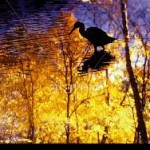I met a man named Michael recently who, with gentle, kind eyes, told me he has a brain tumor that will take his life. He was standing outside of the studio in Winchester when I arrived there one late afternoon. I was alone and at first felt nervous of this man standing by himself, gazing in the studio door. Not for long, though. He approached me to ask if I knew the score of the Redskins game and quickly engaged me in a conversation about football. I had arrived at the studio to set up for a Teacher Training open house and was carrying a platter of pumpkin pop tarts from Mellow Moods. But something reminded me to slow down, that being present with him in that moment was the best yes I could give to my life right then. We talked for a bit until he told me about his tumor. He can no longer work and some days he feels very down. But this day the sky was clear blue, the air warm, and he’d met a new friend who gave him a pop tart. He said, “Isn’t it a beautiful day.” And he meant it.
I’ve thought of this man often since we met. Just a few days after meeting him I visited my teacher Kim Manfredi in Baltimore. She had been thinking about shifting form a lot and had recently taken the 500 hour trainees to a cadaver lab. The lab reminder her, she said, of something we sort of forget every day: that we are going to die. Yes, of course, we are, I thought, but if we think of nothing else we may not ever get anything done. Or perhaps it’s the other way around. Perhaps we’d spend more time like Michael, walking slowly, pausing to talk to a woman he likely won’t see again, marveling at the sky and the temperature and a delicious pop tart–feeling deeply grateful for all of the little things that when paid attention to become the big.
My own form has shifted and changed so much and sometimes it’s hard not to rail against what I once was and had. Right around the time I met Michael, a little seed of bitterness had started to take root and grow in me. I was forgetting to see the blue sky and the lovely gifts abounding in my body and my life, and instead was laser focused on all I could not do and did not have. I think, friends, that this doesn’t have to apply just to considering death, but also to our ever shifting form, physically, mentally, spacially, professionally. Kim reminded me of something from the cadaver lab: that under the skin there is a remarkable whole unit working together. A whole that is very difficult to separate one piece from another. It is difficult to separate the bicep from the triceps or the muscle from the fascia. Under our skin we are whole. The pieces that we call ‘us’ don’t make us whole. We just are.
I’ve been trying to practice feeling this wholeness on the mat. I’ve been working to feel the way that my leg, for example, doesn’t begin or end at the top of my thigh, but instead to feel the sensation of the fascia moving all the way up toward my diaphragm and then that tissue hugging the side of my ribs, and so on, until I can feel my body working as a unit. This often happens when I begin simply, moving with cat/cow to connect long lines of movement from the top of my knees all the way through my hips, pushing through my torso, up into my collar bones and all the way out of the crown of my head. It’s meditative movement for sure and it suspends time in a way that helps me to still my mind and be present with this simple act of feeling my whole body moving together with my breath. It makes me feel really complete and abundant to be present with that movement. And then I’m reminded again the form of me or of my work doesn’t make me, me–and it certainly doesn’t determine the importance of the person or the work at hand.
So thank you Michael, man I might not meet again, for taking the time to remind me to be still with the day and treasure the piece of life I get. Today, my friends, breathe with your whole body and let yourself feel whole just as you are.
Poem, inspired by the words of Mary Oliver and Kim Manfredi:
Sitting by the river’s edge, the glint
of sunlight on the water and the heron poised
nearby the softly rustling reeds, and the sky
surprisingly blue, make me think,
I could stay like this forever.
But as the light shifted behind the November
orange leaves, and the heron took flight
and disappeared beyond the horizon
I remembered, just for a while
just for a while.
Today I am this soft body.
But someday, I will be stone,
and then
wind,
and then
water.
And will I mourn for the vivacity of what
was, or rejoice in the vitality
of what will be?

